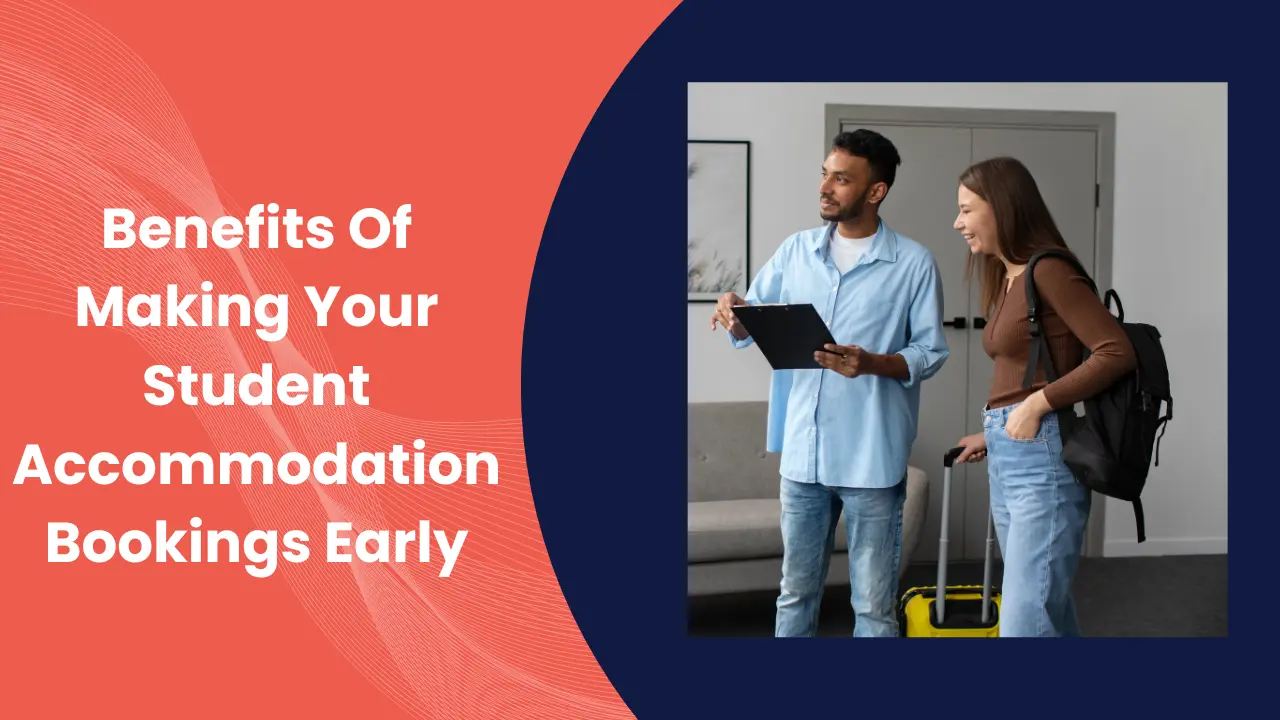Table of Contents
Moving into your first off-campus apartment is thrilling until a scammer dashes your dreams. With rental fraud evolving yearly, students need to be constantly updated on the newer ways these scammers can get to you.
As an international student searching for accommodation, you’re more vulnerable to rental scams than you might think. With thousands of listings online, fraudsters often take advantage by demanding security deposits or move-in fees before you’ve even seen the property. Many create fake legal documents and convincing paper trails to appear legitimate—only to disappear once they have your money.
Don’t fall for these traps! Read this guide to learn how to spot and avoid rental scams as an international student.
What Is a Student Accommodation Rental Scam?
A student apartment rental scam occurs when fraudsters trick renters into paying for fake listings, stealing deposits, personal data, or even identities. These scams often target students and first-time renters through too-good-to-be-true deals or hijacked ads that mimic legitimate properties.
Types of Rental Scams in 2025
Finding student accommodation in a new country can be overwhelming, especially with the rise of online rental scams. Scammers prey on international students unfamiliar with local rental processes, using deceptive tactics to steal money or personal information. From fake listings to bogus landlords, these scams can cost you thousands and leave you without a place to stay.
To help you avoid these traps, here’s a breakdown of the most common house rental scams in 2025:
| Type of Scam | Description | Pro Tip |
| Copied Listings | Scammers steal photos and descriptions from real listings and repost them with fake contact details, often advertising at unusually low prices. | Verify listings through multiple sources. |
| Phantom Rentals | Fraudsters advertise properties that don’t exist or aren’t actually for rent, demanding deposits before disappearing. | Be cautious if a landlord is “out of the country” and insists on upfront payments. |
| Bait-and-Switch Scams | An attractive property is advertised, but when you inquire, you’re offered a different, often inferior unit. | If the landlord refuses to show the exact property listed, walk away. |
| Upfront Payment Scams | Scammers demand deposits or fees before you’ve signed a lease or seen the property. | Avoid paying via untraceable methods like wire transfers or gift cards. |
| Fake Landlord Scams | Imposters pose as landlords, collecting money for properties they don’t own. | Always verify the landlord’s identity and request proof of ownership. |
| No Credit Check Offers | Fraudsters lure renters with “no credit check” rentals, often to steal personal information. Legitimate landlords usually require credit checks. | Be wary of landlords who skip background checks—it could be a red flag. |
| Overpayment Scams | A scammer sends an overpayment via check and asks for a refund before the check bounces | Never refund money until the check has fully cleared. |
| Luxury Amenity Scams | Fake listings advertise high-end amenities (pools, gyms) that don’t exist. | Verify all amenities in person and check tenant reviews. |
| Fake Application Fees | Scammers charge non-refundable fees for fake rentals, targeting students in high-demand areas. | Avoid excessive fees and verify the rental before applying. |
| AI-Generated Listings | AI-created fake listings use virtual tours and cloned agent voices to appear legitimate. | Cross-check listings on multiple platforms before committing. |
Housing scams are evolving, but so are the ways to spot them. As an international student, always research landlords, verify listings, and never rush into paying deposits before confirming the legitimacy of a rental. Trust your instincts—if something feels off, it probably is. Let’s now take a look at some practical tips to stay away from student home rental scams.
Tips to Protect Yourself from Rental Scams
1. Verify the Listing
- Reverse Image Search: Use tools like Google Images to check if photos are stolen from other sites.
- Research the Address: Confirm the property isn’t listed for sale elsewhere. Scammers often repurpose sale listings as rentals.
- Check Landlord Credentials: Search the landlord/property manager’s name online. Legitimate agents have verifiable profiles or company ties.
2. Avoid Non-Traceable Payment Methods
Avoid using cash or non-traceable payment methods for transactions. While you may be asked to pay in cash, these payment options are highly discouraged. Non-traceable payment methods make it difficult to track rental fraud and property scams effectively.
3. Never Skip the Tour
Insist on an in-person or virtual tour. If the landlord refuses, consider it a red flag. For international students, ask a trusted local (friend, university staff) to visit the property.
3. Avoid Upfront Payments
Legitimate landlords typically:
- Collect security deposits after signing a lease.
- Charge application fees under $50 (varies by state).
- Accept checks or secure payment platforms—never wire transfers or gift cards.
4. Demand A Written Lease
A valid lease should include:
- Clear rent amount and due dates.
- Maintenance responsibilities.
- Amenities promised in the listing.
If the lease omits key details, it’s likely fraudulent.
What to Do If You’ve Been Scammed?
- Act Immediately:
- Contact your bank to freeze transactions.
- Report the scam to the FTC (USA) or Competition Bureau (Canada)
- Call up the police. Even though at the moment it can be tough to act immediately, it is the right thing to do.
- Warn Others:
- Notify the listing website (e.g., Zumper, Zillow) to remove the fake ad.
- Share your experience on student forums to protect your peers.
- Review Your Renters Insurance:
If you have renters insurance, review your policy to determine if it covers losses resulting from fraud. Some policies offer coverage for rental scams, and your insurance provider may help you with the recovery process.
- File IC3
You can file a complaint with the Internet Crime Complaint Center (IC3) if you’ve been scammed through an online platform. The IC3 specialises in handling cybercrime cases, including rental fraud, and ensures your complaint is forwarded to the appropriate law enforcement or regulatory agencies for further action.
Rental scams are becoming more sophisticated, making it essential for students to stay cautious. Booking through trusted platforms, seeking recommendations, and conducting thorough background checks can help you avoid potential fraud.
With UniAcco, you can skip the hassle—our listings are verified and secure, ensuring a seamless student housing experience. For the best deals, book early and save more!
FAQs
1. What is a rental listing scam?
A rental listing scam involves fraudsters creating fake advertisements for either nonexistent or already rented properties. These scammers typically ask for upfront payments, such as application fees or deposits, before the potential renter can view the property. The scammer disappears once the payment is made, leaving the victim without a place to live and out of pocket.
2. How can I avoid a rental listing scam?
To avoid rental listing scams, always visit the property in person and never pay any fees before signing a lease. Be cautious of listings that seem too good to be true, and verify the legitimacy of the landlord or property manager.
3. How do you know if a rental property is a scam?
To identify a rental property scam, look for signs such as requests for upfront payments before viewing the property, prices that are significantly lower than comparable listings, and landlords who are unavailable for in-person meetings. Additionally, if the listing appears on multiple sites under different names or if the landlord claims to be out of town, these are major red flags.
4. What should I do if I get scammed?
After being scammed, file a police report and contact your bank immediately to try to stop any payments made. Additionally, report the scam to the Federal Trade Commission (FTC) and any relevant online platforms where the listing was found to help prevent others from falling victim.
5. What should I include in my rental agreement to protect myself?
To protect yourself in a rental agreement, include the following key elements:
- Duration of Tenancy: Clearly state the start and end dates of the lease to avoid disputes about occupancy.
- Rental Amount and Payment Terms: Specify the rent amount, due dates, accepted payment methods, and penalties for late payments.
- Security Deposit Details: Outline the amount of the security deposit, conditions for its return, and any deductions that may apply.
- Maintenance Responsibilities: Define who is responsible for repairs and maintenance to avoid misunderstandings.
- Exit Clause: Include terms regarding early termination, notice periods, and any associated penalties.
With this, we hope this article can help you in making informed decisions about rental scams. If you want to read more such articles, we recommend you check out the blogs below:











0 Comments